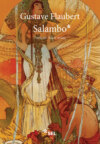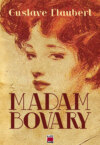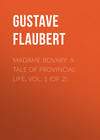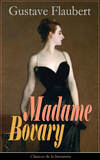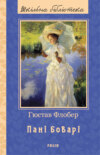Kitabı oku: «Sentimental Education; Or, The History of a Young Man. Volume 2», sayfa 11
"Are you not yourself the painter of a very notable picture?"
"Perhaps! What is it?"
"It represents a lady in a costume – faith! – a little light, with a purse, and a peacock behind."
Frederick, in his turn, reddened. Pellerin pretended that he had not heard the words.
"Nevertheless, it is certainly by you! For your name is written at the bottom of it, and there is a line on it stating that it is Monsieur Moreau's property."
One day, when Père Roque and his daughter were waiting at his residence to see him, they saw the Maréchale's portrait. The old gentleman had even taken it for "a Gothic painting."
"No," said Pellerin rudely, "'tis a woman's portrait."
Martinon added:
"And a living woman's, too, and no mistake! Isn't that so, Cisy?"
"Oh! I know nothing about it."
"I thought you were acquainted with her. But, since it causes you pain, I must beg a thousand pardons!"
Cisy lowered his eyes, proving by his embarrassment that he must have played a pitiable part in connection with this portrait. As for Frederick, the model could only be his mistress. It was one of those convictions which are immediately formed, and the faces of the assembly revealed it with the utmost clearness.
"How he lied to me!" said Madame Arnoux to herself.
"It is for her, then, that he left me," thought Louise.
Frederick had an idea that these two stories might compromise him; and when they were in the garden, Mademoiselle Cécile's wooer burst out laughing in his face.
"Oh, not at all! 'twill do you good! Go ahead!"
What did he mean? Besides, what was the cause of this good nature, so contrary to his usual conduct? Without giving any explanation, he proceeded towards the lower end, where the ladies were seated. The men were standing round them, and, in their midst, Pellerin was giving vent to his ideas. The form of government most favourable for the arts was an enlightened monarchy. He was disgusted with modern times, "if it were only on account of the National Guard" – he regretted the Middle Ages and the days of Louis XIV. M. Roque congratulated him on his opinions, confessing that they overcame all his prejudices against artists. But almost without a moment's delay he went off when the voice of Fumichon attracted his attention.
Arnoux tried to prove that there were two Socialisms – a good and a bad. The manufacturer saw no difference whatever between them, his head becoming dizzy with rage at the utterance of the word "property."
"'Tis a law written on the face of Nature! Children cling to their toys. All peoples, all animals are of my opinion. The lion even, if he were able to speak, would declare himself a proprietor! Thus I myself, messieurs, began with a capital of fifteen thousand francs. Would you be surprised to hear that for thirty years I used to get up at four o'clock every morning? I've had as much pain as five hundred devils in making my fortune! And people will come and tell me I'm not the master, that my money is not my money; in short, that property is theft!"
"But Proudhon – "
"Let me alone with your Proudhon! if he were here I think I'd strangle him!"
He would have strangled him. After the intoxicating drink he had swallowed Fumichon did not know what he was talking about any longer, and his apoplectic face was on the point of bursting like a bombshell.
"Good morrow, Arnoux," said Hussonnet, who was walking briskly over the grass.
He brought M. Dambreuse the first leaf of a pamphlet, bearing the title of "The Hydra," the Bohemian defending the interests of a reactionary club, and in that capacity he was introduced by the banker to his guests.
Hussonnet amused them by relating how the dealers in tallow hired three hundred and ninety-two street boys to bawl out every evening "Lamps,"[H] and then turning into ridicule the principles of '89, the emancipation of the negroes, and the orators of the Left; and he even went so far as to do "Prudhomme on a Barricade," perhaps under the influence of a kind of jealousy of these rich people who had enjoyed a good dinner. The caricature did not please them overmuch. Their faces grew long.
This, however, was not a time for joking, so Nonancourt observed, as he recalled the death of Monseigneur Affre and that of General de Bréa. These events were being constantly alluded to, and arguments were constructed out of them. M. Roque described the archbishop's end as "everything that one could call sublime." Fumichon gave the palm to the military personage, and instead of simply expressing regret for these two murders, they held disputes with a view to determining which ought to excite the greatest indignation. A second comparison was next instituted, namely, between Lamoricière and Cavaignac, M. Dambreuse glorifying Cavaignac, and Nonancourt, Lamoricière.
Not one of the persons present, with the exception of Arnoux, had ever seen either of them engaged in the exercise of his profession. None the less, everyone formulated an irrevocable judgment with reference to their operations.
Frederick, however, declined to give an opinion on the matter, confessing that he had not served as a soldier. The diplomatist and M. Dambreuse gave him an approving nod of the head. In fact, to have fought against the insurrection was to have defended the Republic. The result, although favourable, consolidated it; and now they had got rid of the vanquished, they wanted to be conquerors.
As soon as they had got out into the garden, Madame Dambreuse, taking Cisy aside, chided him for his awkwardness. When she caught sight of Martinon, she sent him away, and then tried to learn from her future nephew the cause of his witticisms at the Vicomte's expense.
"There's nothing of the kind."
"And all this, as it were, for the glory of M. Moreau. What is the object of it?"
"There's no object. Frederick is a charming fellow. I am very fond of him."
"And so am I, too. Let him come here. Go and look for him!"
After two or three commonplace phrases, she began by lightly disparaging her guests, and in this way she placed him on a higher level than the others. He did not fail to run down the rest of the ladies more or less, which was an ingenious way of paying her compliments. But she left his side from time to time, as it was a reception-night, and ladies were every moment arriving; then she returned to her seat, and the entirely accidental arrangement of the chairs enabled them to avoid being overheard.
She showed herself playful and yet grave, melancholy and yet quite rational. Her daily occupations interested her very little – there was an order of sentiments of a less transitory kind. She complained of the poets, who misrepresent the facts of life, then she raised her eyes towards heaven, asking of him what was the name of a star.
Two or three Chinese lanterns had been suspended from the trees; the wind shook them, and lines of coloured light quivered on her white dress. She sat, after her usual fashion, a little back in her armchair, with a footstool in front of her. The tip of a black satin shoe could be seen; and at intervals Madame Dambreuse allowed a louder word than usual, and sometimes even a laugh, to escape her.
These coquetries did not affect Martinon, who was occupied with Cécile; but they were bound to make an impression on M. Roque's daughter, who was chatting with Madame Arnoux. She was the only member of her own sex present whose manners did not appear disdainful. Louise came and sat beside her; then, yielding to the desire to give vent to her emotions:
"Does he not talk well – Frederick Moreau, I mean?"
"Do you know him?"
"Oh! intimately! We are neighbours; and he used to amuse himself with me when I was quite a little girl."
Madame Arnoux cast at her a sidelong glance, which meant:
"I suppose you are not in love with him?"
The young girl's face replied with an untroubled look:
"Yes."
"You see him often, then?"
"Oh, no! only when he comes to his mother's house. 'Tis ten months now since he came. He promised, however, to be more particular."
"The promises of men are not to be too much relied on, my child."
"But he has not deceived me!"
"As he did others!"
Louise shivered: "Can it be by any chance that he promised something to her;" and her features became distracted with distrust and hate.
Madame Arnoux was almost afraid of her; she would have gladly withdrawn what she had said. Then both became silent.
As Frederick was sitting opposite them on a folding-stool, they kept staring at him, the one with propriety out of the corner of her eye, the other boldly, with parted lips, so that Madame Dambreuse said to him:
"Come, now, turn round, and let her have a good look at you!"
"Whom do you mean?"
"Why, Monsieur Roque's daughter!"
And she rallied him on having won the heart of this young girl from the provinces. He denied that this was so, and tried to make a laugh of it.
"Is it credible, I ask you? Such an ugly creature!"
However, he experienced an intense feeling of gratified vanity. He recalled to mind the reunion from which he had returned one night, some time before, his heart filled with bitter humiliation, and he drew a deep breath, for it seemed to him that he was now in the environment that really suited him, as if all these things, including the Dambreuse mansion, belonged to himself. The ladies formed a semicircle around him while they listened to what he was saying, and in order to create an effect, he declared that he was in favor of the re-establishment of divorce, which he maintained should be easily procurable, so as to enable people to quit one another and come back to one another without any limit as often as they liked. They uttered loud protests; a few of them began to talk in whispers. Little exclamations every now and then burst forth from the place where the wall was overshadowed with aristolochia. One would imagine that it was a mirthful cackling of hens; and he developed his theory with that self-complacency which is generated by the consciousness of success. A man-servant brought into the arbour a tray laden with ices. The gentlemen drew close together and began to chat about the recent arrests.
Thereupon Frederick revenged himself on the Vicomte by making him believe that he might be prosecuted as a Legitimist. The other urged by way of reply that he had not stirred outside his own room. His adversary enumerated in a heap the possible mischances. MM. Dambreuse and Grémonville found the discussion very amusing. Then they paid Frederick compliments, while expressing regret at the same time that he did not employ his abilities in the defence of order. They grasped his hand with the utmost warmth; he might for the future count on them. At last, just as everyone was leaving, the Vicomte made a low bow to Cécile:
"Mademoiselle, I have the honour of wishing you a very good evening."
She replied coldly:
"Good evening." But she gave Martinon a parting smile.
Pére Roque, in order to continue the conversation between himself and Arnoux, offered to see him home, "as well as Madame" – they were going the same way. Louise and Frederick walked in front of them. She had caught hold of his arm; and, when she was some distance away from the others she said:
"Ah! at last! at last! I've had enough to bear all the evening! How nasty those women were! What haughty airs they had!"
He made an effort to defend them.
"First of all, you might certainly have spoken to me the moment you came in, after being away a whole year!"
"It was not a year," said Frederick, glad to be able to give some sort of rejoinder on this point in order to avoid the other questions.
"Be it so; the time appeared very long to me, that's all. But, during this horrid dinner, one would think you felt ashamed of me. Ah! I understand – I don't possess what is needed in order to please as they do."
"You are mistaken," said Frederick.
"Really! Swear to me that you don't love anyone!"
He did swear.
"You love nobody but me alone?"
"I assure you, I do not."
This assurance filled her with delight. She would have liked to lose her way in the streets, so that they might walk about together the whole night.
"I have been so much tormented down there! Nothing was talked about but barricades. I imagined I saw you falling on your back covered with blood! Your mother was confined to her bed with rheumatism. She knew nothing about what was happening. I had to hold my tongue. I could stand it no longer, so I took Catherine with me."
And she related to him all about her departure, her journey, and the lie she told her father.
"He's bringing me back in two days. Come to-morrow evening, as if you were merely paying a casual visit, and take advantage of the opportunity to ask for my hand in marriage."
Never had Frederick been further from the idea of marriage. Besides, Mademoiselle Roque appeared to him a rather absurd young person. How different she was from a woman like Madame Dambreuse! A very different future was in store for him. He had found reason to-day to feel perfectly certain on that point; and, therefore, this was not the time to involve himself, from mere sentimental motives, in a step of such momentous importance. It was necessary now to be decisive – and then he had seen Madame Arnoux once more. Nevertheless he was rather embarrassed by Louise's candour.
He said in reply to her last words:
"Have you considered this matter?"
"How is that?" she exclaimed, frozen with astonishment and indignation.
He said that to marry at such a time as this would be a piece of folly.
"So you don't want to have me?"
"Nay, you don't understand me!"
And he plunged into a confused mass of verbiage in order to impress upon her that he was kept back by more serious considerations; that he had business on hand which it would take a long time to dispose of; that even his inheritance had been placed in jeopardy (Louise cut all this explanation short with one plain word); that, last of all, the present political situation made the thing undesirable. So, then, the most reasonable course was to wait patiently for some time. Matters would, no doubt, right themselves – at least, he hoped so; and, as he could think of no further grounds to go upon just at that moment, he pretended to have been suddenly reminded that he should have been with Dussardier two hours ago.
Then, bowing to the others, he darted down the Rue Hauteville, took a turn round the Gymnase, returned to the boulevard, and quickly rushed up Rosanette's four flights of stairs.
M. and Madame Arnoux left Pére Roque and his daughter at the entrance of the Rue Saint-Denis. Husband and wife returned home without exchanging a word, as he was unable to continue chattering any longer, feeling quite worn out. She even leaned against his shoulder. He was the only man who had displayed any honourable sentiments during the evening. She entertained towards him feelings of the utmost indulgence. Meanwhile, he cherished a certain degree of spite against Frederick.
"Did you notice his face when a question was asked about the portrait? When I told you that he was her lover, you did not wish to believe what I said!"
"Oh! yes, I was wrong!"
Arnoux, gratified with his triumph, pressed the matter even further.
"I'd even make a bet that when he left us, a little while ago, he went to see her again. He's with her at this moment, you may be sure! He's finishing the evening with her!"
Madame Arnoux had pulled down her hat very low.
"Why, you're shaking all over!"
"That's because I feel cold!" was her reply.
As soon as her father was asleep, Louise made her way into Catherine's room, and, catching her by the shoulders, shook her.
"Get up – quick! as quick as ever you can! and go and fetch a cab for me!"
Catherine replied that there was not one to be had at such an hour.
"Will you come with me yourself there, then?"
"Where, might I ask?"
"To Frederick's house!"
"Impossible! What do you want to go there for?"
It was in order to have a talk with him. She could not wait. She must see him immediately.
"Just think of what you're about to do! To present yourself this way at a house in the middle of the night! Besides, he's asleep by this time!"
"I'll wake him up!"
"But this is not a proper thing for a young girl to do!"
"I am not a young girl – I'm his wife! I love him! Come – put on your shawl!"
Catherine, standing at the side of the bed, was trying to make up her mind how to act. She said at last:
"No! I won't go!"
"Well, stay behind then! I'll go there by myself!"
Louise glided like an adder towards the staircase. Catherine rushed after her, and came up with her on the footpath outside the house. Her remonstrances were fruitless; and she followed the girl, fastening her undervest as she hurried along in the rear. The walk appeared to her exceedingly tedious. She complained that her legs were getting weak from age.
"I'll go on after you – faith, I haven't the same thing to drive me on that you have!"
Then she grew softened.
"Poor soul! You haven't anyone now but your Catau, don't you see?"
From time to time scruples took hold of her mind.
"Ah, this is a nice thing you're making me do! Suppose your father happened to wake and miss you! Lord God, let us hope no misfortune will happen!"
In front of the Théâtre des Variétés, a patrol of National Guards stopped them.
Louise immediately explained that she was going with her servant to look for a doctor in the Rue Rumfort. The patrol allowed them to pass on.
At the corner of the Madeleine they came across a second patrol, and, Louise having given the same explanation, one of the National Guards asked in return:
"Is it for a nine months' ailment, ducky?"
"Oh, damn it!" exclaimed the captain, "no blackguardisms in the ranks! Pass on, ladies!"
In spite of the captain's orders, they still kept cracking jokes.
"I wish you much joy!"
"My respects to the doctor!"
"Mind the wolf!"
"They like laughing," Catherine remarked in a loud tone. "That's the way it is to be young."
At length they reached Frederick's abode.
Louise gave the bell a vigorous pull, which she repeated several times. The door opened a little, and, in answer to her inquiry, the porter said:
"No!"
"But he must be in bed!"
"I tell you he's not. Why, for nearly three months he has not slept at home!"
And the little pane of the lodge fell down sharply, like the blade of a guillotine.
They remained in the darkness under the archway.
An angry voice cried out to them:
"Be off!"
The door was again opened; they went away.
Louise had to sit down on a boundary-stone; and clasping her face with her hands, she wept copious tears welling up from her full heart. The day was breaking, and carts were making their way into the city.
Catherine led her back home, holding her up, kissing her, and offering her every sort of consolation that she could extract from her own experience. She need not give herself so much trouble about a lover. If this one failed her, she could find others.
CHAPTER XVI.
Unpleasant News from Rosanette
When Rosanette's enthusiasm for the Gardes Mobiles had calmed down, she became more charming than ever, and Frederick insensibly glided into the habit of living with her.
The best portion of the day was the morning on the terrace. In a light cambric dress, and with her stockingless feet thrust into slippers, she kept moving about him – went and cleaned her canaries' cage, gave her gold-fishes some water, and with a fire-shovel did a little amateur gardening in the box filled with clay, from which arose a trellis of nasturtiums, giving an attractive look to the wall. Then, resting, with their elbows on the balcony, they stood side by side, gazing at the vehicles and the passers-by; and they warmed themselves in the sunlight, and made plans for spending the evening. He absented himself only for two hours at most, and, after that, they would go to some theatre, where they would get seats in front of the stage; and Rosanette, with a large bouquet of flowers in her hand, would listen to the instruments, while Frederick, leaning close to her ear, would tell her comic or amatory stories. At other times they took an open carriage to drive to the Bois de Boulogne. They kept walking about slowly until the middle of the night. At last they made their way home through the Arc de Triomphe and the grand avenue, inhaling the breeze, with the stars above their heads, and with all the gas-lamps ranged in the background of the perspective like a double string of luminous pearls.
Frederick always waited for her when they were going out together. She was a very long time fastening the two ribbons of her bonnet; and she smiled at herself in the mirror set in the wardrobe; then she would draw her arm over his, and, making him look at himself in the glass beside her:
"We produce a good effect in this way, the two of us side by side. Ah! my poor darling, I could eat you!"
He was now her chattel, her property. She wore on her face a continuous radiance, while at the same time she appeared more languishing in manner, more rounded in figure; and, without being able to explain in what way, he found her altered, nevertheless.
One day she informed him, as if it were a very important bit of news, that my lord Arnoux had lately set up a linen-draper's shop for a woman who was formerly employed in his pottery-works. He used to go there every evening – "he spent a great deal on it no later than a week ago; he had even given her a set of rosewood furniture."
"How do you know that?" said Frederick.
"Oh! I'm sure of it."
Delphine, while carrying out some orders for her, had made enquiries about the matter, She must, then, be much attached to Arnoux to take such a deep interest in his movements. He contented himself with saying to her in reply:
"What does this signify to you?"
Rosanette looked surprised at this question.
"Why, the rascal owes me money. Isn't it atrocious to see him keeping beggars?"
Then, with an expression of triumphant hate in her face:
"Besides, she is having a nice laugh at him. She has three others on hand. So much the better; and I'll be glad if she eats him up, even to the last farthing!"
Arnoux had, in fact, let himself be made use of by the girl from Bordeaux with the indulgence which characterises senile attachments. His manufactory was no longer going on. The entire state of his affairs was pitiable; so that, in order to set them afloat again, he was at first projecting the establishment of a café chantant, at which only patriotic pieces would be sung. With a grant from the Minister, this establishment would become at the same time a focus for the purpose of propagandism and a source of profit. Now that power had been directed into a different channel, the thing was impossible.
His next idea was a big military hat-making business. He lacked capital, however, to give it a start.
He was not more fortunate in his domestic life. Madame Arnoux was less agreeable in manner towards him, sometimes even a little rude. Berthe always took her father's part. This increased the discord, and the house was becoming intolerable. He often set forth in the morning, passed his day in making long excursions out of the city, in order to divert his thoughts, then dined at a rustic tavern, abandoning himself to his reflections.
The prolonged absence of Frederick disturbed his habits. Then he presented himself one afternoon, begged of him to come and see him as in former days, and obtained from him a promise to do so.
Frederick did not feel sufficient courage within him to go back to Madame Arnoux's house. It seemed to him as if he had betrayed her. But this conduct was very pusillanimous. There was no excuse for it. There was only one way of ending the matter, and so, one evening, he set out on his way.
As the rain was falling, he had just turned up the Passage Jouffroy, when, under the light shed from the shop-windows, a fat little man accosted him. Frederick had no difficulty in recognising Compain, that orator whose motion had excited so much laughter at the club. He was leaning on the arm of an individual whose head was muffled in a zouave's red cap, with a very long upper lip, a complexion as yellow as an orange, a tuft of beard under his jaw, and big staring eyes listening with wonder.
Compain was, no doubt, proud of him, for he said:
"Let me introduce you to this jolly dog! He is a bootmaker whom I include amongst my friends. Come and let us take something!"
Frederick having thanked him, he immediately thundered against Rateau's motion, which he described as a manœuvre of the aristocrats. In order to put an end to it, it would be necessary to begin '93 over again! Then he enquired about Regimbart and some others, who were also well known, such as Masselin, Sanson, Lecornu, Maréchal, and a certain Deslauriers, who had been implicated in the case of the carbines lately intercepted at Troyes.
All this was new to Frederick. Compain knew nothing more about the subject. He quitted the young man with these words:
"You'll come soon, will you not? for you belong to it."
"To what?"
"The calf's head!"
"What calf's head?"
"Ha, you rogue!" returned Compain, giving him a tap on the stomach.
And the two terrorists plunged into a café.
Ten minutes later Frederick was no longer thinking of Deslauriers. He was on the footpath of the Rue de Paradis in front of a house; and he was staring at the light which came from a lamp in the second floor behind a curtain.
At length he ascended the stairs.
"Is Arnoux there?"
The chambermaid answered:
"No; but come in all the same."
And, abruptly opening a door:
"Madame, it is Monsieur Moreau!"
She arose, whiter than the collar round her neck.
"To what do I owe the honour – of a visit – so unexpected?"
"Nothing. The pleasure of seeing old friends once more."
And as he took a seat:
"How is the worthy Arnoux going on?"
"Very well. He has gone out."
"Ah, I understand! still following his old nightly practices. A little distraction!"
"And why not? After a day spent in making calculations, the head needs a rest."
She even praised her husband as a hard-working man. Frederick was irritated at hearing this eulogy; and pointing towards a piece of black cloth with a narrow blue braid which lay on her lap:
"What is it you are doing there?"
"A jacket which I am trimming for my daughter."
"Now that you remind me of it, I have not seen her. Where is she, pray?"
"At a boarding-school," was Madame Arnoux's reply.
Tears came into her eyes. She held them back, while she rapidly plied her needle. To keep himself in countenance, he took up a number of L'Illustration which had been lying on the table close to where she sat.
"These caricatures of Cham are very funny, are they not?"
"Yes."
Then they relapsed into silence once more.
All of a sudden, a fierce gust of wind shook the window-panes.
"What weather!" said Frederick.
"It was very good of you, indeed, to come here in the midst of this dreadful rain."
"Oh! what do I care about that? I'm not like those whom it prevents, no doubt, from going to keep their appointments."
"What appointments?" she asked with an ingenuous air.
"Don't you remember?"
A shudder ran through her frame and she hung down her head.
He gently laid his hand on her arm.
"I assure you that you have given me great pain."
She replied, with a sort of wail in her voice:
"But I was frightened about my child."
She told him about Eugène's illness, and all the tortures which she had endured on that day.
"Thanks! thanks! I doubt you no longer. I love you as much as ever."
"Ah! no; it is not true!"
"Why so?"
She glanced at him coldly.
"You forget the other! the one you took with you to the races! the woman whose portrait you have – your mistress!"
"Well, yes!" exclaimed Frederick, "I don't deny anything! I am a wretch! Just listen to me!"
If he had done this, it was through despair, as one commits suicide. However, he had made her very unhappy in order to avenge himself on her with his own shame.
"What mental anguish! Do you not realise what it means?"
Madame Arnoux turned away her beautiful face while she held out her hand to him; and they closed their eyes, absorbed in a kind of intoxication that was like a sweet, ceaseless rocking. Then they stood face to face, gazing at one another.
"Could you believe it possible that I no longer loved you?"
She replied in a low voice, full of caressing tenderness:
"No! in spite of everything, I felt at the bottom of my heart that it was impossible, and that one day the obstacle between us two would disappear!"
"So did I; and I was dying to see you again."
"I once passed close to you in the Palais-Royal!"
"Did you really?"
And he spoke to her of the happiness he experienced at coming across her again at the Dambreuses' house.
"But how I hated you that evening as I was leaving the place!"
"Poor boy!"
"My life is so sad!"
"And mine, too! If it were only the vexations, the anxieties, the humiliations, all that I endure as wife and as mother, seeing that one must die, I would not complain; the frightful part of it is my solitude, without anyone."
"But you have me here with you!"
"Oh! yes!"
A sob of deep emotion made her bosom swell. She spread out her arms, and they strained one another, while their lips met in a long kiss.
A creaking sound on the floor not far from them reached their ears. There was a woman standing close to them; it was Rosanette. Madame Arnoux had recognised her. Her eyes, opened to their widest, scanned this woman, full of astonishment and indignation. At length Rosanette said to her:
"I have come to see Monsieur Arnoux about a matter of business."
"You see he is not here."
"Ah! that's true," returned the Maréchale. "Your nurse is right! A thousand apologies!"
And turning towards Frederick:
"So here you are – you?"
The familiar tone in which she addressed him, and in her own presence, too, made Madame Arnoux flush as if she had received a slap right across the face.
"I tell you again, he is not here!"
Then the Maréchale, who was looking this way and that, said quietly:
"Let us go back together! I have a cab waiting below."


